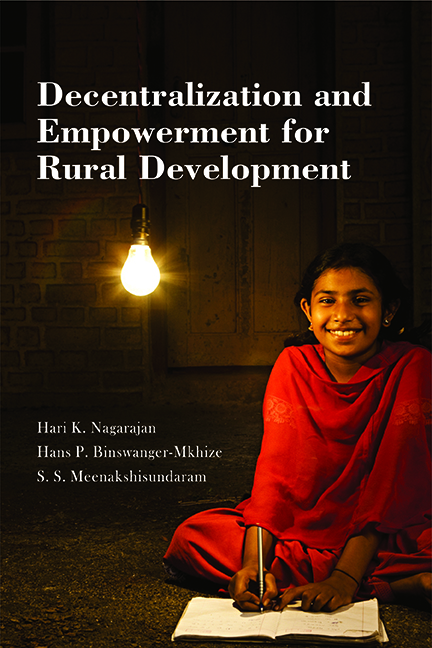Book contents
- Frontmatter
- Contents
- List of Tables and Figures
- Foreword 1
- Foreword 2
- Preface
- 1 Introduction
- 2 Decentralization: Cross-country Experiences
- 3 Thinking about Decentralization in India: 73rd Amendment and Beyond
- 4 Literature
- 5 An Overview of the Data
- 6 Analytical Approaches and Econometric Methods Used
- 7 Can Panchayats Improve the Quality of Services? Some Qualitative Evidence
- 8 Impact of Political Reservations for Women in Panchayats
- 9 Importance of Individual Empowerment of Women
- 10 Governance, Service Provision and Development Outcomes
- 11 The Impact of Fiscal Grants on Tax Efforts of Village Panchayats
- 12 Incidence of Identity-based Voting and Bribes in Panchayats
- 13 Panchayats and Household Vulnerability
- 14 Key Findings, Conclusions and Policy Recommendations
- References
- Index
- About the Authors
14 - Key Findings, Conclusions and Policy Recommendations
Published online by Cambridge University Press: 30 November 2022
- Frontmatter
- Contents
- List of Tables and Figures
- Foreword 1
- Foreword 2
- Preface
- 1 Introduction
- 2 Decentralization: Cross-country Experiences
- 3 Thinking about Decentralization in India: 73rd Amendment and Beyond
- 4 Literature
- 5 An Overview of the Data
- 6 Analytical Approaches and Econometric Methods Used
- 7 Can Panchayats Improve the Quality of Services? Some Qualitative Evidence
- 8 Impact of Political Reservations for Women in Panchayats
- 9 Importance of Individual Empowerment of Women
- 10 Governance, Service Provision and Development Outcomes
- 11 The Impact of Fiscal Grants on Tax Efforts of Village Panchayats
- 12 Incidence of Identity-based Voting and Bribes in Panchayats
- 13 Panchayats and Household Vulnerability
- 14 Key Findings, Conclusions and Policy Recommendations
- References
- Index
- About the Authors
Summary
The major contribution of this book is to significantly strengthen the evidence on the impacts of the PRI on local governance, services, and economic welfare. The loop is closed from citizen involvement in governance, to local government actions and outputs, and all the way to their development outcomes. Not only is the degree of empowerment of various groups studied, but also the mechanisms that lead to it, such as participation in elections, attendance in gram sabha meetings, or the payment of bribes; and their impacts on a variety of economic and social welfare indicators such as time saved fetching water, educational achievement in terms of literacy, health and income.
The overall findings of the report suggest a strong link between decentralization, empowerment and development. The evidence also suggests that democratization enhances the benefits from decentralization. However, decentralization, empowerment and local democracy are still very imperfectly implemented in India. Particularly striking is the lack of fiscal decentralization and poor administrative capacities in the panchayats associated with the lack of devolution of staff. It is therefore surprising that there are still so many positive impacts of decentralization.
The basis for our conclusions and recommendations are our own findings in this book. However, the recommendations also draw on the reports of the various commissions discussed in chapter three that studied decentralization and made useful and often converging recommendations on how to improve it.
The current status of decentralization in India
Decentralization of governance in India has been very poorly implemented on average, with wide variations among states (Alok, 2012). The main deficiency is the lack of devolution of functions, funds and functionaries (the three Fs). India is at the bottom of developing countries in this respect. Additional weaknesses come from the fragmentation of central and state programmes and funding streams, the retention of decision-making authority in sectors, the states and at the national levels, limited progress in bottoms-up planning, and poor accountability of sector officers and local government functionaries to their populations. The outcome of decentralization has therefore been judged as very poor (Chapter 2).
Nevertheless, since the passage of the 73rd Amendment of the Constitution empowering the PRI in 1993, the existing literature documents steady progress in empowerment of citizens in general, as well as of marginalized groups such as Scheduled Castes and Scheduled tribes, (SC/ST) and women.
- Type
- Chapter
- Information
- Decentralization and Empowerment for Rural Development , pp. 333 - 344Publisher: Foundation BooksPrint publication year: 2014

